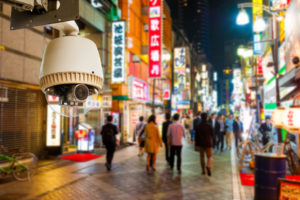
Stay on Side
Don't get arrested in Japan!
Stay on Side
Don't get arrested in Japan!
 As a visitor to Japan, you are in a strange land where the culture and customs may be way different from back home. Laws and regulations are also a lot different and getting on the wrong side of the law can be a traumatic, and life changing situation. While crime rates in Japan are very low compared to many other countries, penalties and conviction rates are very high.
As a visitor to Japan, you are in a strange land where the culture and customs may be way different from back home. Laws and regulations are also a lot different and getting on the wrong side of the law can be a traumatic, and life changing situation. While crime rates in Japan are very low compared to many other countries, penalties and conviction rates are very high.
While Japan constitution does include a Habeas Corpus clause, it has often been criticized by legal scholars and the United Nations Human Rights committee. It is more often a case of guilty until proven innocent here.
Arrest in Japan may lead to a lengthy stay in a police detention center. Under Japanese Law, suspects can be detained for up to 23 days without charge, and you are not able to request bail during this period. After that, if charged then the public prosecutor has discretion to extend detention, discretion subject to court approval, which is generally given. This may lead to several months in detention, even for what would be considered a minor crime in many other countries.
Suspects are entitled to one free visit from the on-duty lawyer during the first 3 days of their detention, and visits by consular authorities are possible, but often difficult to arrange.
It is also to be noted that conviction rates in Japan exceed 99% (including guilty pleas), so if you are charged, then it is almost certain that you will be convicted.
Visitors are allowed into Japanese detention facilities but are tightly controlled, with visiting hours only on Monday to Friday. Police may also insist on a translator to be present, at the suspects expense, for the duration of the visit, and all conversation must be simultaneously translated to the officer who is sitting in on the visit.
Common Offenses
 According to Nagano Prefectural Police figures, the amount of theft in Ski Resorts is on the rise.
According to Nagano Prefectural Police figures, the amount of theft in Ski Resorts is on the rise.
Theft
On resort theft of Skis and Snowboards has grown in recent years and has led to the police asking people to chain up their equipment when taking lunch breaks.
Drink Driving
There has also been a number of arrests for drunk driving. Japan has a limit of 0.03g of alcohol in the blood when driving, and if you are caught with even a small amount of alcohol in your system, you will be arrested and charged. This amount is less than one drink for most women, and about 1 beer for men. For all intensive purposes, if the police suspect you have alcohol in your system, they will detain and test you. In addition, it is illegal to be in the same vehicle as a person who is under the influence, it is illegal to lend a car to someone who has been drinking, and it is also illegal to serve alcohol to someone who is planning to drive. If you are found to have more than 0.03g of alcohol in your system, then you could be sentenced to up to 5 years in prison and up to a 1 million yen fine. If you cause an accident and injury while driving intoxicated, then you may be looking at up to 20 years imprisonment.
If you are out and have had a few drinks, ask your bartender if there is a Dial-a-driver (“Daiko”) service in the area. These guys will come and get you and drive you and your car home, at a price that is similar to a taxi.
Alcohol Related
Other alcohol related crimes are also on the rise. Because Japan does not have any responsible alcohol service guidelines, and because getting drunk in Japan is not frowned upon, bars will often keep serving customers until they become very intoxicated. In the cities it is possible to sleep it off on a park bench without too many consequences, but in snowy regions it can become an extremely dangerous situation. Getting over intoxicated can lead to severe legal issues in Japan.
Firstly, it is very rare for a Japanese person to get violent while drunk. Overwhelmingly, the get happy to a point, then get very sleepy. While it can be irritating for a drunk Japanese Salary-man to interrupt your conversation, it is not a major issue. Violence in Japan is an extremely serious issue, and can lead to long term imprisonment. Damage to property will also result in hefty fines and possible imprisonment.
The other aspect is the safety one. Coming out of a bar at 2AM, and trying to get back to your accommodation after the taxis have stopped can be difficult, and many people end up walking long distances in severely cold conditions. This is especially serious if a person is along, and gets disorientated. Both Hakuba and Niseko have had visitors disappear in recent years after leaving bars late at night. Keeping an eye on your friends behavior and cutting them off if they get too intoxicated if one of the biggest favors you can do them.
Alcohol also seems to be a factor in other crimes, such a shoplifting and trespassing. Drunken patrons are often arrested at convenience stores, and supermarkets for popping items into their pockets and “forgetting” to pay. This can escalate to assault, if the person in question tries to escape and pushes a staff member trying to retrain them. Such cases often lead to lengthy prison sentences.
Trespass
Trespassing often occurs late at night, when an intoxicated person leaving a bar, finds they are unable to locate their accommodation, and needs to find shelter. This leads to them entering another property in order to stay warm. While this is a safe thing to do, imagine how you’d feel if a hungover person is sleeping on your sofa when you get up in the morning. Officially, this crime has up to a 3 year prison sentence an / or a maximum fine of 100,000yen.
Drugs
Drugs are also highly illegal, and if the police find any type of stimulant drug in your possession you will be doing between 1 and 20 years in jail. Cannabis possession has a maximum of 7 years in prison, while supply can see up to 10 years. If it is Cocaine, you may be looking at up to 10 years in prison, or 20 years for supply. Fines also are levied.
In almost all cases of incarceration in Japan, at the completion of your sentence you will be deported.So please, don’t get on the wrong side of the law in Japan.
A Case in Point
 A few years back, an accommodation property in Hakuba contacted me as a guest we had booked into their accommodation had gotten drunk the night before, and thought it would be funny to get into one of those little white utes you see so much in Japan, and drive it around and around the car park.
A few years back, an accommodation property in Hakuba contacted me as a guest we had booked into their accommodation had gotten drunk the night before, and thought it would be funny to get into one of those little white utes you see so much in Japan, and drive it around and around the car park.
His friends were egging him on, and he did a few donuts and wound up crashing into a snow bank.
Still in the driver’s seat laughing, the police arrive and he is taken into custody, and his nightmare began.
He was interrogated without a lawyer for 3 days in Omachi police cells. No translation was provided. When he wasn’t being interrogated, he had to sit up straight in his cell with his legs tucked up under him, meaning it was difficult to stand when he had to use the bathroom. He was not allowed contact with the outside world, and his friends were concerned and contacted his parents in Australia.
His Dad contacted the Australian Embassy for help, and flew to Japan. About this time, he was moved from Omachi to Suzaka police station, which has larger facilities for detention and interrogation. No one was told of this move.
Finally the Embassy was able to track him down, and on about day 8 of his detention, his father asked me to act as translator for a visit that had finally been arranged. I drove the father over to Suzaka from Hakuba, and we were both frisked and shown into the visitor room. The visit was conducted through Perspex glass, with holes cut in to allow sound to pass.
I sat next to his father, and a police officer sat next to him. His father was extremely shocked at his appearance. He had lost weight and looked very tired. Totally different from the carefree lad he’d driven to the airport less than a fortnight ago.
The kid knew he’d stuffed up and admitted it to his father. This kid had been a scholarship candidate, who according to his dad had never been in trouble in his life. Seeing his father, he brightened up a bit, and recounted his time in detention.
The joy of seeing his father led him to slip up, and forgot the police officer was there. And for some reason the kid started talking about the TV show “Prison Break”. I tell the kid to shut up, as I supposed to be providing a real time translation of what he is saying to the police office. The officer yells at me and demands to know what I said, to which I replied that I was just confirming the name of a TV show he mentioned and told the cop it was a comedy. But this brought the visit to an end.
The kid spent the full 23 days behind bars, paid off the owner of the vehicle, and was deported from Japan, with no chance of visiting Japan Powder again for at least 10 years.
